|
|
|
Sort Order |
|
|
|
Items / Page
|
|
|
|
|
|
|
| Srl | Item |
| 1 |
ID:
091826
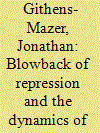

|
|
|
|
|
| Publication |
2009.
|
| Summary/Abstract |
The narrative of the historic struggle against colonialism is subject to a high degree of political manipulation in North Africa. Myths, memories and symbols based on the struggle against colonial oppression, whether 'true' or not, provide a latent and continually relevant context for understanding and interpreting contemporary events. For both recent North African immigrants, and second, third and fourth generation immigrants to Europe, contemporary injustices and violence, whether perpetrated in Europe or in the Maghreb, are being understood in this historical colonial context. For some, these myths, memories and symbols may be the reason why they join a peaceful, democratic group to lobby for democracy and political transparency. For a minority of North Africans, these symbols of the past are invoked to justify a jihadist challenge to North African regimes and the West. Based on extensive interviews with North African activists and community leaders, this article will show how the collective memory of the abuse of power by the state, both during and after the colonial era, has created a latent mistrust of the West, especially of France. Political repression in North Africa since independence has created a rupture between what was expected from independence and the realities of political life, and North Africans often ascribe this disappointment to the inherently French character of the regimes which were in power during the 1950s and 1960s. North Africans also believe that this is reflected in the continuing active intervention on the part of the West to support these illiberal regimes in the face of democratic and popular challenges. The subsequent senses of injustice and disappointment, relating to the use and abuse of state power, continues to shape North African political mobilization and, worryingly, has created a latent basis for radicalization among North Africans living and working in Europe.
|
|
|
|
|
|
|
|
|
|
|
|
|
|
|
|
| 2 |
ID:
091823
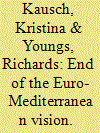

|
|
|
|
|
| Publication |
2009.
|
| Summary/Abstract |
Relations between the European Union and North Africa have veered away from the political vision expounded under the Barcelona Process. The Union for the Mediterranean will likely deepen this trend. The Euro-Mediterranean space is increasingly characterized by competitive, containment-based and exclusionary security strategies. The more political dimensions of the partnership are now given short shrift and the EU appears inattentive to the dynamics of change within North African societies. Countries such as Spain and the UK have been overly passive in rescuing the Euro-Med vision from French diplomacy and the nature of relations between Europe and North Africa are increasingly out of sync with the changing international system.
|
|
|
|
|
|
|
|
|
|
|
|
|
|
|
|
| 3 |
ID:
091827
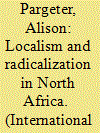

|
|
|
|
|
| Publication |
2009.
|
| Summary/Abstract |
Over the past three decades North Africa has experienced a wave of Islamic activism. From the emergence of groups such as Shabiba Islamiya in Morocco in the 1970s to the recent appearance of Al-Qaeda in the Islamic Maghreb, the region has been home to a plethora of different Islamist movements, each with its own national characteristics. As such the region has displayed a general propensity to Islamist activism. However, certain areas within each North African state have proven particularly receptive to the ideology of political Islam. Although this trend is by no means universal, given the strong appeal of the Islamist ideology that has been able to transcend geographical boundaries, these areas have nonetheless been a key source of recruitment not only for the more moderate strands of the Islamist opposition, but also to the militant movements and networks that espouse violence. As such there would appear to be a correlation between localism and Islamist activism in North Africa. Focusing on Morocco, Tunisia and Libya, this article will examine some of these local issues and will argue that in order to understand better the causes of radicalization in the region, the rise of Islamism in North Africa should be considered within the broader historical context of political and cultural resistance by certain peripheral regional elements to a dele-gitimized and stagnated central authority.
|
|
|
|
|
|
|
|
|
|
|
|
|
|
|
|
| 4 |
ID:
091822
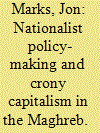

|
|
|
|
|
| Publication |
2009.
|
| Summary/Abstract |
Twenty years on from the Arab Maghreb Union (UMA)'s creation, the European Community, which encouraged the move, has long evolved into the European Union, including old eastern European members which two decades ago seemed to be behind many UMA members in their potential to suck in Financial Direct Investment. While North African economies have continued to make significant progress, their structures and practices have not evolved nearly as quickly as seemed likely two decades ago. This article focuses on the political economy aspects of North Africa's perceived problems of drawing in investment and promoting regional integration: the domestic politics of the Euro-Med's Maghrebi partners, not only in the sense that 'nationalist' policy-making has a major impact on economic outcomes but also in the prevalence of crony capitalism across the region.
|
|
|
|
|
|
|
|
|
|
|
|
|
|
|
|
| 5 |
ID:
091825
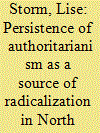

|
|
|
|
|
| Publication |
2009.
|
| Summary/Abstract |
September 11 and subsequent terrorist attacks across the globe have led to an increased emphasis on security issues among political leaders globally. While this preoccupation with security has not led to the abandonment of democracy promotion efforts, there is no doubt that initiatives that have the demise of authoritarianism as their core objective, have become less of a priority in recent years, with spending on projects seemingly unrelated to security issues and the 'war on terror' declining, and pressure on heads of state to embark on democratization processes weakening. This article contends that the relieving of pressure on heads of state to introduce democratic reforms is detrimental to the desired goal of increased security, given that the radicalization of Islamists is closely related to the prevalence of authoritarianism. In short, it is argued that there is reason to believe that the West's tendency to allow violations of basic democratic principles, and failing to employ genuine pressure for regime change in the various MENA states, which are actively partaking in the 'war on terror' on the side of the US, is counterproductive in the longer run. While it is impossible to predict when terrorism committed by radicalized Islamists will end, and it is almost certain that terrorist attacks will recur in the future and that we have to learn to live with the risks, it is possible however to do something about the scale and frequency of such incidents. This article argues that through positive democracy promotion resulting in real democratization, it is indeed possible to obtain increased security.
|
|
|
|
|
|
|
|
|
|
|
|
|
|
|
|
| 6 |
ID:
091821


|
|
|
|
|
| Publication |
2009.
|
| Summary/Abstract |
North Africa is notable for the remarkable stability of its political systems despite the increasingly hostile social and economic environment in which they operate. In part this results from their current security engagement with Europe but more important, perhaps, is the shared political culture that informs them despite the great differences between them and their failure to fulfill the principles upon which they were, for the most part, founded. This is, in part, typified by the very similar mechanisms they have each developed to ensure political continuity, based either on monarchical succession or dynastic republicanism. It is less clear, however, that they will be able to resist the most recent challenges arising from Islamist social movements, although the new political dispensations that might emerge may not be so very different from their predecessors.
|
|
|
|
|
|
|
|
|
|
|
|
|
|
|
|
| 7 |
ID:
091824
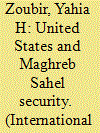

|
|
|
|
|
| Publication |
2009.
|
| Summary/Abstract |
Although the Maghreb has never been a priority, it now represents a region of significant interest for the United States. The importance of the Maghreb, and its Sahel extension, springs first from political and economic/energy interests, and second, from military, strategic and security concerns. The first relates to America's energy needs in the region, as well as to the regionalization that could create a potentially lucrative market for US businesses, especially since competition with China has increased over its recent gains in Africa. The second motivation, linked to the first, stems from Washington's new strategy and security policies initiated since 9/11 which have heightened the need for a new type of management concerning security, Islamism, terrorism, and, for a time, democratization. Unquestionably, the problems of terrorism, illegal migration, and other illegal activities are symptoms which cannot be understood if they are disconnected from their causes. However, rather than promoting economic development and good governance, the United States has focused predominantly on hard security matters and established a security system in the region which has continued under the Obama administration. Furthermore, Washington has not so far distanced itself from the regimes in the region whose authoritarianism, mismanagement of the economy, and violation of civil liberties is precisely what brought about the ills from which the Maghreb-Sahel suffers. Without addressing these issues therefore, there is little chance that the region will witness long-lasting peace, security, and prosperity. Furthermore, the protracted conflict in the Western Sahara, the resolution of which has been impeded by the geopolitical considerations of outside powers, has not only hindered the necessary construction of an integrated Maghreb, but also has the potential of leading to regional conflict.
|
|
|
|
|
|
|
|
|
|
|
|
|
|
|
|
|
|
|
|
|